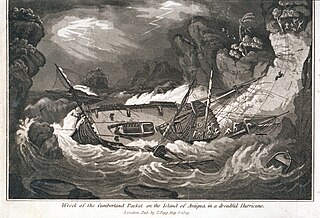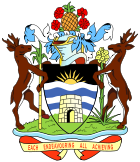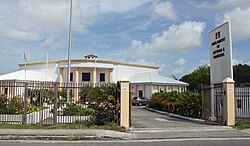
Antigua and Barbuda is a sovereign island country in the Caribbean. It lies at the conjuncture of the Caribbean Sea and the Atlantic Ocean in the Leeward Islands part of the Lesser Antilles.

The Government of Barbados (GoB), is a unitary parliamentary republic, where the President of Barbados is the head of state and the Prime Minister of Barbados is the head of government.
The politics of Grenada takes place in a framework of a parliamentary representative democracy, whereby the prime minister is the head of government. Grenada is an independent Commonwealth realm. It is governed under a multi-party parliamentary system whose political and legal traditions closely follow those of the United Kingdom; it has a prime minister and a cabinet, and a bicameral Parliament with an elected House of Representatives and an appointed Senate. Executive power is exercised by the government. Legislative power is vested in both the government and parliament. Constitutional safeguards include freedom of speech, press, worship, motion, and association. Grenada is a member of the eastern Caribbean court system. The Judiciary is independent of the executive and the legislature. Jurisprudence is based on English common law.

Politics in Jamaica takes place in the framework of a representative parliamentary democratic constitutional monarchy. The 1962 Constitution of Jamaica established a parliamentary system whose political and legal traditions closely follow those of the United Kingdom. As the head of state, King Charles III - on the advice of the Prime Minister of Jamaica - appoints a governor-general as his representative in Jamaica. The governor-general has a largely ceremonial role, with their parliamentary function consisting simply of granting royal assent to bills which have passed Parliament. Jamaica constitutes an independent Commonwealth realm.

Politics of Saint Lucia takes place in the framework of an independent parliamentary democratic constitutional monarchy, with King Charles III as its head of state, represented by a Governor General, who acts on the advice of the prime minister and the cabinet. The prime minister is the leader of the majority party of the house, and the cabinet conducts affairs of state. The Governor General exercises basically ceremonial functions, but residual powers, under the constitution, can be used at the governor general's discretion. The actual power in St. Lucia lies with the prime minister and the cabinet, usually representing the majority party in parliament.

The history of Antigua and Barbuda covers the period from the arrival of the Archaic peoples thousands of years ago to the present day. Prior to European colonization, the lands encompassing present-day Antigua and Barbuda were inhabited by three successive Amerindian societies. The island was claimed by England, who settled the islands in 1632. Under English/British control, the islands witnessed an influx of both Britons and African slaves migrate to the island. In 1981, the islands were granted independence as the modern state of Antigua and Barbuda.

The Antigua and Barbuda Labour Party (ABLP) is a political party in Antigua and Barbuda. The current leader of the party is Gaston Browne, who serves as the Prime Minister of Antigua and Barbuda. The party had previously been led by Lester Bird, who was chairman of the party since 1971, and was Prime Minister and political leader in 1994.

The prime minister of Antigua and Barbuda is the head of government of the Antigua and Barbuda. The prime minister of Antigua and Barbuda is appointed by the Governor-General under the terms of the Constitution.

Elections in Antigua and Barbuda take place in the framework of a parliamentary democracy.

The Parliament of Antigua and Barbuda consists of the King of Antigua and Barbuda, the Senate and the House of Representatives.

The House of Representatives of Antigua and Barbuda is the lower chamber of the country's bicameral parliament. Each of the constituencies created in accordance with section 62 of the Constitution shall elect one representative to the House in a direct election in accordance with the procedures specified by or pursuant to any law, subject to the rules of the Constitution. Unless he is prohibited by law from registration as a voter for the purpose of electing a member of the House, every Commonwealth citizen who is eighteen years of age or older and who meets the requirements relating to residence or domicile in Antigua and Barbuda as prescribed by Parliament is entitled to be registered as such a voter in accordance with the provisions of any law in that regard, and no other person may be registered. Every person who is registered to vote in any constituency shall, unless prohibited from doing so by any law, be entitled to vote in accordance with the provisions of any law in that regard in any election of members of the House in that constituency. Voting is free and must be done by secret ballot in accordance with any rules that Parliament may impose during House member elections.

The Senate is the Upper House of Parliament of Antigua and Barbuda. It consists of 17 members appointed by the Governor General. Ten members are appointed on the advice of the Prime Minister, four on the advice of the Leader of the Opposition, one on the advice of the Barbuda Council, one resident of Barbuda on the advice of the Prime Minister, and one at the Governor General's discretion. Subject to the provisions of Section 30 of the Constitution, any person who at the time of his appointment: is a citizen; is twenty-one years of age or older; has lived in Antigua and Barbuda for the twelve months immediately prior to the date of his appointment; and is able to speak and, unless disabled by blindness or another physical condition, to read the English language with enough proficiency to allow him to take an active part in the proceedings.

The monarchy of Antigua and Barbuda is a system of government in which a hereditary monarch is the sovereign and head of state of Antigua and Barbuda. The current Antiguan and Barbudan monarch and head of state, since 8 September 2022, is King Charles III. As sovereign, he is the personal embodiment of the Crown of Antigua and Barbuda. Although the person of the sovereign is equally shared with 14 other independent countries within the Commonwealth of Nations, each country's monarchy is separate and legally distinct. As a result, the current monarch is officially titled King of Antigua and Barbuda and, in this capacity, he and other members of the Royal Family undertake public and private functions domestically and abroad as representatives of Antigua and Barbuda. However, the King is the only member of the Royal Family with any constitutional role.

The Government of Antigua and Barbuda (GOAB), is a unitary constitutional monarchy, where the Monarch of Antigua and Barbuda serves as the head of state, represented by the Governor-General of Antigua and Barbuda, and the Prime Minister of Antigua and Barbuda serves as the head of government.
Asot Michael is an Antiguan politician and a Member of the Parliament of Antigua and Barbuda, elected from Saint Peter Constituency. He was also the Minister of Tourism, Economic Development, Investment and Energy under Prime Minister Gaston Browne. He was formerly a member of the Antigua and Barbuda Labour Party.

The Cabinet of Antigua and Barbuda is the executive branch of the government of Antigua and Barbuda. Section 70(1) of the Constitution establishes the Cabinet. The Cabinet is made up of the Prime Minister and as many other Ministers as the Prime Minister deems necessary, one of whom will be the Attorney-General and will be nominated in accordance with section 69 of the Constitution. Only the Prime Minister or, in his absence, the Minister the Prime Minister appoints in that regard, may call the Cabinet to order.

Trevor Myke Walker is a Barbudan politician, current member of parliament for Barbuda, and former Cabinet Minister under the Baldwin Spencer administration. He is a member of the Barbuda People's Movement, a party that seeks the independence of Barbuda from Antigua and Barbuda.

The president of Barbados is the head of state of Barbados and the commander-in-chief of the Barbados Defence Force. The office was established when the country became a parliamentary republic on 30 November 2021. Before, the head of state was Elizabeth II, Queen of Barbados, who was represented on the island by a governor-general. The first and current president is Sandra Mason, who previously served as the last governor-general.

The Leader of the Opposition, officially the Leader of His Majesty's Opposition, is the leader of the largest political party in the House of Representatives of Antigua and Barbuda that is not in government. The Leader of the Opposition is appointed by the Governor-General of Antigua and Barbuda.

General elections were held in Antigua and Barbuda on 18 January 2023 to elect members of the House of Representatives. The Labour Party (ABLP) has held an absolute majority of 15 seats in the House of Representatives after the 2018 general election, with Gaston Browne remaining as prime minister. Browne initiated a constitutional referendum after the 2018 election, which was rejected by voters, and following the death of Elizabeth II in 2022, he announced his intention to organise a referendum for the transition of Antigua and Barbuda to a republican system. Besides ABLP, the United Progressive Party (UPP), Democratic National Alliance, Barbuda People's Movement (BPM), and three independent politicians filed candidacies for the 2023 general election.



















